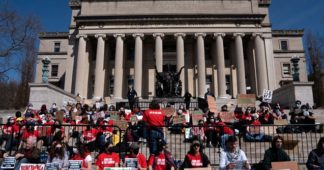Lee Fang
Apr 22, 2025
Research institutes and universities may engage in boycotts or divestment to pressure any country or government entity in the world. Recent institutional boycotts include measures to protest corporations that do business in North Carolina and China. That right no longer exists when it comes to protests of Israel.
Researchers and university employees who engage in certain nonviolent protests or political expression over human rights conditions in Israel may risk civil and criminal penalties, according to a new policy unveiled by the National Institutes of Health yesterday. The agency, the largest public funder of biomedical research in the world, touches virtually every corner of the scientific community.
The blanket boycott suppression is a radical expansion of so-called “anti-BDS” rules that restrict Americans from boycotting or simply advocating divestment from Israel-related businesses. The new NIH policy, which mirrors anti-BDS laws applied to contractors in thirty eight states, now silences hundreds of thousands of researchers. It applies to all “domestic recipients of new, renewal, supplement, or continuation awards” issued starting April 21.
The Trump administration policy reflects a dramatic escalation in speech-policing regarding Israel. Since March 8th, immigration agents have arrested and threatened to deport a number of foreign students who have engaged in protests or criticism of Israel’s government. Rumeysa Ozturk, a 30-year old PhD student at Tufts University caught in the recent sweep, was arrested by U.S. Immigration and Customs Enforcement agents last month. She now resides in an ICE prison cell in Louisiana.
The administration claimed Ozturk “engaged in activities in support of Hamas, a foreign terrorist organization.” But the government failed to furnish a single shred of evidence to support these claims. An internal State Department memo found that the agency had no legal authority to remove her and found no ties to terrorism or antisemitism.
Ozturk was reportedly targeted for simply co-authoring an opinion column last year calling for her university to “disclose its investments and divest from companies with direct or indirect ties to Israel” in order to pressure Israel to end its war in Gaza and change its policies towards the Palestinian people. In sum, she engaged in the very boycott-related speech now banned by the new NIH policy.
Simultaneously, the administration is waging a wide-ranging showdown with several universities. The fight hinges on several issues, including the issue of academic research and speech rights regarding Israel. Federal research funds to Harvard University, Columbia University, Cornell University, and other schools have been revoked or frozen, in part in order to force local universities into adopting speech codes related to Israel and to allow the government to place various Middle East Studies departments into academic receivership.
Such brazen attacks on the First Amendment have only accelerated. Just as other forms of censorship are justified as necessary tools to combat hate, misinformation or bigotry, the Trump administration and its allies have argued that draconian measures are necessary to stop the scourge of antisemitism.
David Friedman, the former Trump ambassador to Israel, spoke at an Israeli government conference last month and discussed the need to crackdown on antisemites using government power. “We can deport them, we can put them in jail, we can make their lives miserable,” boasted Friedman. “We can cut off their funding—and that’s what the Trump administration is doing for the first time,” he added.
Left unmentioned from Friedman’s talk is the fact that many leading critics of Israeli policy and proponents of nonviolent boycotts are Jewish.
We remind our readers that publication of articles on our site does not mean that we agree with what is written. Our policy is to publish anything which we consider of interest, so as to assist our readers in forming their opinions. Sometimes we even publish articles with which we totally disagree, since we believe it is important for our readers to be informed on as wide a spectrum of views as possible.











